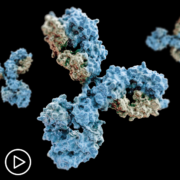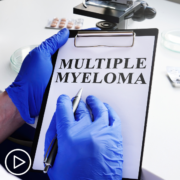Relapsed/Refractory Follicular Lymphoma Treatments and Bispecific Antibodies
Relapsed/Refractory Follicular Lymphoma Treatments and Bispecific Antibodies from Patient Empowerment Network on Vimeo.
What can relapsed/refractory follicular lymphoma patients expect for current and future treatment options? Expert Dr. Sameh Gaballa explains what treatments are currently available and ones that are being studied for the future.
Dr. Sameh Gaballa is a hematologist/oncologist specializing in treating lymphoid malignancies from Moffitt Cancer Center. Learn more about Dr. Gaballa.
See More from START HERE Follicular Lymphoma
Related Resources:

Follicular Lymphoma Monitoring and Maintenance: An Expert Weighs In |

|

|
Transcript:
Lisa Hatfield:
Another patient is asking if you can speak to emerging treatment options for patients with relapsed/refractory follicular lymphoma?
Dr. Sameh Gaballa:
Yeah. So the field of follicular lymphoma is changing rapidly. I always tell patients that sometimes the best treatment is actually on a clinical trial because those are going to be the next generation of treatments that are going to get approved in the next few years. But right now we have the most effective therapy really is CAR T-cell therapy. CAR T-cell therapy by far is the most effective treatment we have at this time. It’s approved for patients who have had two or more lines of prior therapies. We also are investigating this. I actually have a trial here at Moffitt where we’re looking at CAR T-cell therapy as early as in the second line, in patients who have what we call the high-risk ones, the POD24. So a patient with POD24 follicular lymphoma relapsed in less than two years. We have a trial to investigate the role of CAR T-cell therapy in this setting. The other very promising group of treatments, again, is bispecific antibodies, again, currently approved in the third line, mosunetuzumab-axgb (Lunsumio).
But there are others coming up and have data on epcoritamab-bysp (Epkinly), as well as a lot of other bispecifics, as well as combinations. I mean, epcoritamab-bysp has also data presented with combination with lenalidomide. And right now, the follow-up duration is not very long, but so far, it looks extremely promising with very high response rates. So those also might be coming very soon. And, of course, once something works in the relapsed/refractory setting, we start looking at earlier lines of therapy. And actually, we’re now looking at trials in the first-line setting with some of these agents as well. Tazemetostat (Tazverik) is a pill. It’s also approved in the third-line setting, but we’re also investigating it. We have a trial here where we’re looking at combining it with standard rituximab (Rituxan), lenalidomide (Revlimid), so tazemetostat plus rituximab, lenalidomide as early as in the second line. So that also is interesting. And as I mentioned before, BTK inhibitors currently being looked at in trials might also have a role in follicular lymphoma very soon.
Lisa Hatfield:
And this patient is asking about the significance of bispecific antibody treatment. And you touched on that a little bit. It looks like she’s also asking if there are specific genetic or molecular markers that can predict a patient’s response. And if I try to translate that, maybe she might be asking about targeted therapy.
Dr. Sameh Gaballa:
Yeah, so bispecific antibodies and CAR T-cell therapy, they target something called CD, either CD19 or CD20, and that’s almost universally expressed on B cells. So most of your follicular lymphoma patients are going to be expressing CD19 or CD20. Tazemetostat is the pill that I talked about. It inhibits an enzyme called EZH2. Some patients have an EZH2 mutation where it seems to work very well. However, tazemetostat also works in patients who don’t have that mutation. So that’s why it’s not very important to check for the mutation.
It seems maybe it works better in patients who do have the mutation, but it does work as well in patients who do not have that mutation. So unlike other malignancies and other cancers, biomarkers are not yet driving a lot of our treatment decisions in follicular lymphoma as of right now.
Lisa Hatfield:
How exactly do bispecific antibodies engage the patient’s immune system to target and eliminate follicular lymphoma cells?
Dr. Sameh Gaballa:
So bispecific antibodies are a very interesting class of medicines. It’s an antibody that has two ends to it. So one end would target the patient’s own immune cells, meaning that they would attach the antibody to the patient’s own immune cell and then the other end of the antibody engages the cancer cell. So it’s basically hand-holding the patient’s own immune system to go and kill the cancer cell. And this is not just in lymphoma. It’s looked at in multiple myeloma as well, approved therapies there. And a lot of other cancers, we have bispecific antibodies being developed in clinical trials right now.










